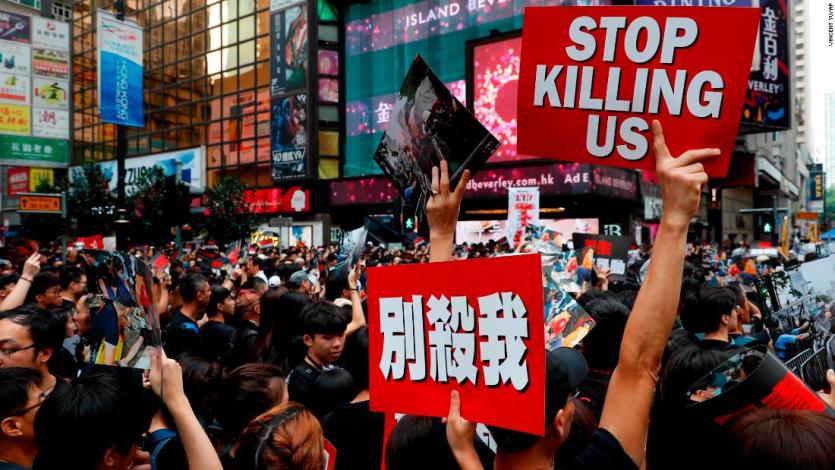Organizers of Sunday's demonstration called for authorities to drop charges against the 11 people arrested during protests Wednesday. Many of those attending Sunday's march carried signs with the slogan "stop killing us" alongside images of bloodied protesters. AP
 JUNE 21st 2019
JUNE 21st 2019
By Patryk Krych | The World Daily
Extradition Bill Sparks Continued Protests in Hong Kong
Black-clad protesters blocked roads and surrounded police headquarters in Hong Kong on Friday, numbering in the thousands and standing in opposition of the recent extradition bill. The bill has instigated a number of demonstrations over the week, as protestors took to the streets.
Many of the protestor groups consisted primarily of students, clad in face masks, hard hats, and goggles in mainly black attire, setting up roadblocks and successfully trapping vehicles in a protest that generally lacked violence and sought only to be widely intrusive as a demand to leader Carrie Lam, who’d at first promoted and then postponed the extradition bill, that she does not implement it. As a result, many typically busy roads were entirely empty near the central formerly British colony.
Student Edison Ng said that “Having people here is giving pressure to the government that we don’t agree with your extradition plans.” He also added that “It is not clear how long we will stay... To go or not to go, the people will decide.”
To Chinese President Xi Jinping, the protests represent the greatest challenge he’s faced thus far, since he had taken up the role of president back in 2012. Jinping was forced once again to initiate the temporary closure of Hong Kong government offices, having had to consider several concerns over security.
Protesters chanted near and around police headquarters, having been calling out for the stepping down of police chief Stephen. Activists were warned by police not to charge or resort to violent means during the protests.
On Friday night, hundreds of protesters had remained and continued their demonstration with the greater majority sitting peacefully, and cooling one-another each other with water to keep cool on the high-temperature day.
Hong Kong was still part of the British colonies, until its return to Chinese power in the year 1997, and as such it had since then been governed in a different manner – since its return to Chinese rule it has been governed under a “one country, two systems” formula. This system allowed freedoms and exceptions originally not had in mainland China, including a much-appreciated independent judiciary.
With the extradition bill being feared as a first step into the intrusion of those freedoms, it is understandable that millions march out into the streets, clogging the roads and transport of the Asian financial centre this month as a means to rally against the bill. The bill in question would overshadow Hong Kong judiciary laws and allow people to be extradited to the mainland to face trial in courts, presently controlled by the Communist Party.
Police fired rubber bullets and tear gas upon the protesters as a means to disperse the disruptions. Beijing’s tensions triggered a series of pro-democracy protests/demonstrations back in 2014 that halted certain parts of the city for up to 79 days.
By Patryk Krych | The World Daily






